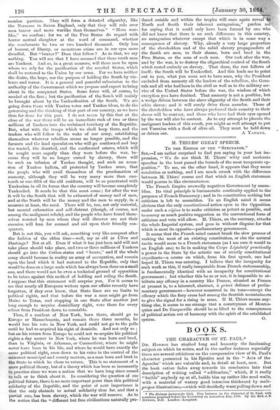M. t HIERS' GREAT SPEECH.
To THE EDITOR OF THE "SPECTATOR."
SIR,—I am rather surprised to find you saying in your last im- pression, "We do not think M. Thiers' witty and moderate speeches in the least passed the bounds of the most temperate op- position." To me, on the other hand, it appears that they mean revolution or nothing, and I am much struck with the difference between M. Thiers' course and that which an English statesman would pursue in like circumstances.
The French Empire avowedly negatives Government by assem- blies. Its vital principle is bureaucratic continuity applied to the purposes of French Democracy; and in its constitution nothing but criticism is left to assemblies. 'To an English mind it seems obvious that the only constitutional action open to the Opposition under such a re'ginie is to make criticism as potent as possible, and to convey as much positive suggestion as the conventional form of criticism and veto will allow. M. Thiers, on the contrary, attacks the whole Imperial system, and goes in without. disguise for that which is most its opposite—parliamentary government.
It seems that the French mind cannot brook the slow process of making the most of an existing constitution, or else the natural tactic would seem to a French statesman (as I am sure it would to an English one) to lie in making the Corps Ligislatif practically a power in the State by the artistic use of strictly constitutional expedients—a course on which, from his first speech, one had hoped M. Thiers was entering. I believe that the incapacity for such work as this, if really inseparable from French statesmanship, is fundamentally identical with an incapacity for constitutional government ; but whether this be so or not, it is impossible to at- tribute any efficacy in a country like France, situated as France at present is, to a laboured, abstract, a priori defence of parlia- mentary government—however measured in its tone—except the efficacy which the fiery cross had among the Scottish mountaineers to give the signal for a rising in arms. If M. Thiers means any- thing else, it seems to me strange that a countryman of Montes- quien and De Tocqueville should be so blind to the consequences of political action out of harmony with the spirit of the established






























 Previous page
Previous page